AirVPN spent more than a decade in the VPN marketplace, being founded in 2010 in Italy. The entire thing about this provider started out as a passion project to improve users’ privacy and protect them from ever-growing government surveillance and censorship.
Indeed, AirVPN is owned and operated by hacktivists and activists, and the provider promises to give its users “The Air to Breathe the Real Internet”, hence the name AirVPN. This AirVPN review for 2025 will help you discover if the provider stuck to its claims or if it’s just another average product.
The service isn’t very popular, although it offers a fair bit of features, functionalities, and lots of customization options. Right off the bat, I’ll tell you that this isn’t a VPN for beginners due to its advanced nature and the ability to fully customize every aspect of your experience.
That said, I had plenty of time to review AirVPN through many tests. As a result, I will talk about its app support, streaming capabilities, performance, privacy/security, pricing, customer support, and so much more, to make you understand this provider fully.
As always, this is going to be an in-depth review and evaluation of this VPN, so if you’re seriously considering it, also seriously consider reading this review to the very end. For now, let’s get to work and see what this interesting service has to bring to the table.
The 3 best alternatives to AirVPN:
7492 servers
118 covered countries
30 days money-back guarantee
10 simultaneous connections
9.8 /10
3000 servers
105 covered countries
30 days money-back guarantee
8 simultaneous connections
9.4 /10
12000 servers
100 covered countries
45 days money-back guarantee
7 simultaneous connections
9.2 /10
AirVPN User Experience & Device Support
When you visit AirVPN’s website for the first time, you instantly get a flashback to the 2010s. I mean, I’ve used this provider since its inception and it hasn’t changed a tiny bit, as it still boasts that outdated website design that can confuse even more experienced users.
Once you click on Download, you’ll be able to see its device support which isn’t the best in the world. This is a provider focused on privacy and security, with other functions being somewhat neglected. One of them is device compatibility which limits the VPN to a few basic platforms.
Yes, it has a VPN for Windows but also for Linux, macOS, Android, iOS, and Chrome OS. These apps aren’t all native, which I found extremely disappointing. For example, if you want to use it on iOS, you’ll have to download the OpenVPN client and configure the provider using the config files from the site.
The Android app, however, is native and AirVPN takes advantage of this Eddie UI to make its VPN work. Beginners will be confused at first but if you see an app called “Eddie-UI” on your PC or Android phone, know that this is actually AirVPN.
Enough about that. How many simultaneous connections does AirVPN offer? Sadly, there are only 5 of them per subscription, which isn’t an impressive number considering that many providers offer more. I can mention CyberGhost with 7 of them or even Surfshark which puts no limits.
Desktop and Mobile Apps
Let’s now talk about the user experience in this AirVPN review. I recently tested ExpressVPN and in that review, I said its user experience is superb. The provider perfectly masked its complex infrastructure with a simple, easy-to-use app approachable by beginners.
AirVPN, however, goes full-on with the old-school app design that isn’t the most welcoming. Once you sign in, you’ll see the option to activate Network Lock, which is a kill switch. On the left, you can click on Servers to open the server list, which, once again, looks outdated.
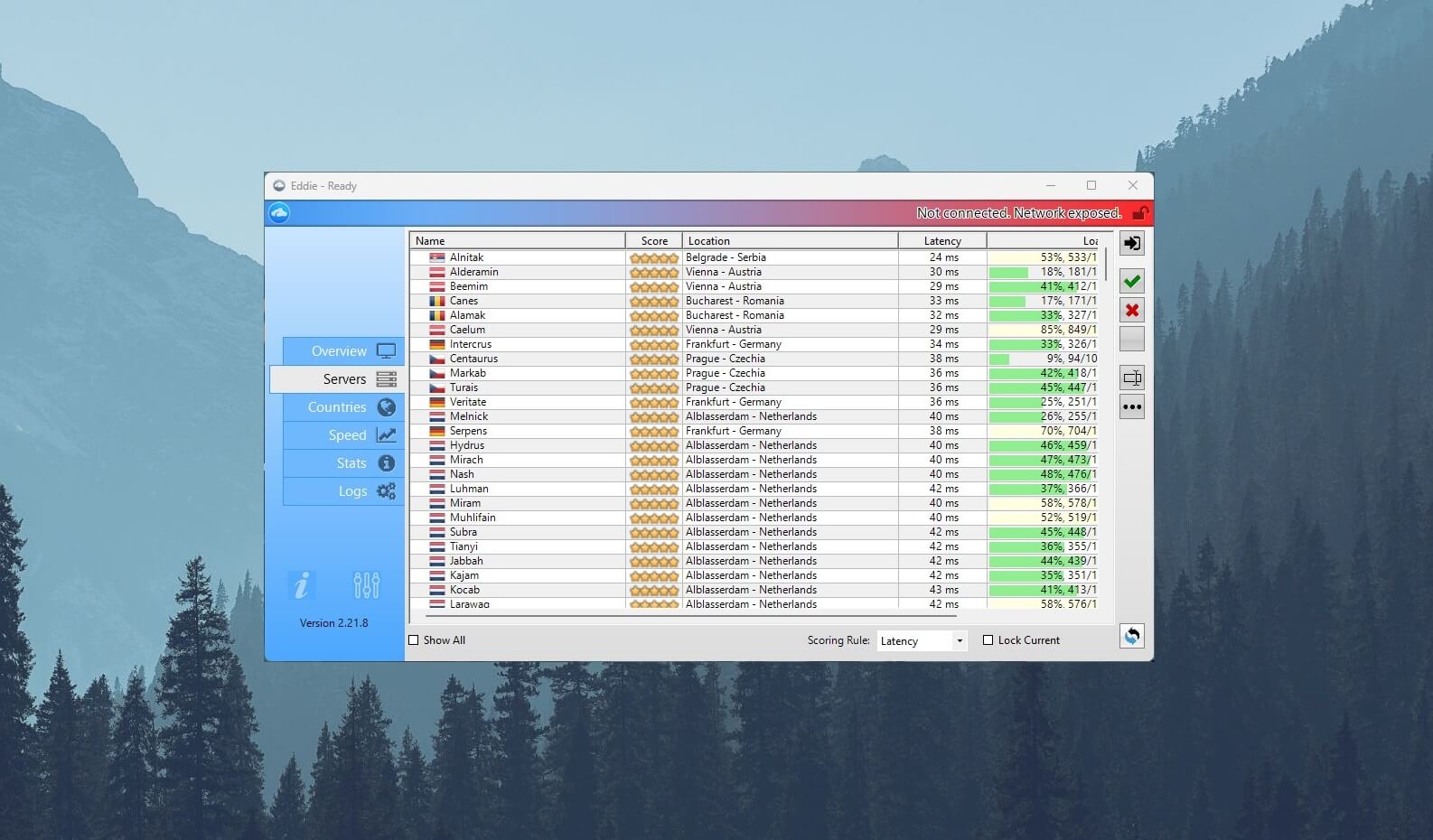
The good thing is that you can see the server score, latency, as well as the load the server is put under. I like the ability to change the scoring rule, so you can rank the servers according to speed and latency if you need to use the VPN to play online games.
You can also check the individual countries by clicking on the Countries menu. I like that AirVPN shows you the exact number of users per country and interestingly, the majority of AirVPN users are using Canada and the US – a fun fact.
When you open Settings, you’ll see that AirVPN is quite intimidating if you’re not experienced. There’s a boatload of settings and features here and despite the app looking like it belongs to the Windows 98 era, you can still somewhat customize it.
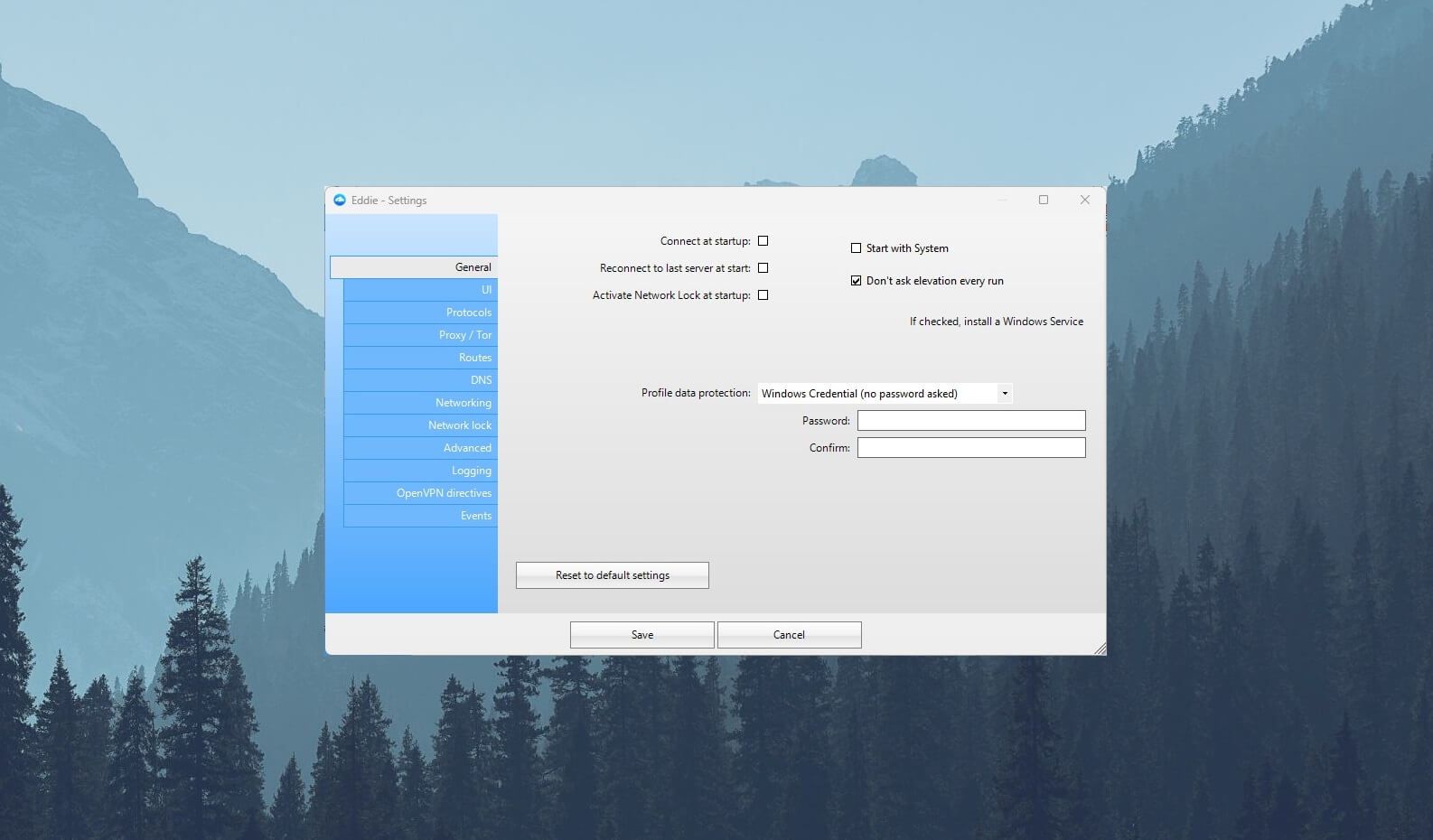
For example, clicking on UI lets you change the main font and make the app look cooler if you want. The General menu lets you change the behavior of the app, and other menus allow you to enable its VPN-related features which we’ll talk about later in the AirVPN review.
I’m a user of iOS and I don’t have an Android phone. Since AirVPN uses the OpenVPN client for this system, I won’t show the interface because it’s a third-party app and not the app from this provider. OpenVPN is pretty easy to use, although I prefer having a native app.
TV Apps
Reliance on the OpenVPN client permeates its TV support as well. When you check its supported platforms, you’ll see that AirVPN supports Android TV, which is excellent for a particular group of TVs that use this system.
You can, as such, install AirVPN on TVs from Philips, Xiaomi, and a few others. Unfortunately, the provider doesn’t support Fire TV Stick natively, although it can be made to work using several advanced methods, such as sideloading or using a router.
Since it works on Android, it’s vital to mention that it can be a VPN for Nvidia Shield TV as well. If you can’t find it on Google Play through Shield TV, you can sideload it using your USB flash drive and download an APK file from the site.
Either way, I don’t recommend using it on your TV because this is among the worst VPN providers for streaming. Later in my AirVPN test and review for 2025, I’ll talk about everything about that and see just how bad it is in regards to unblocking geo-restricted content.
Gaming Apps
Gamers can utilize AirVPN on a wide array of platforms that support gaming. I prefer using it on Windows since it’s easy, but you can do the same on iOS, Android, macOS, and even Linux. As for gaming console support, it’s here but it’s not stated explicitly.
However, AirVPN supports routers, which immediately allows you to connect this VPN to any device or platform. Some people will use it on Apple TV, for example, while others will install it on PlayStation, Nintendo, or Xbox gaming consoles.
The good news is that AirVPN can be used for gaming and in my speed test of this provider, we’ll see if you can enjoy playing games with low latency online.
Router Support
Finally, router support is here and the provider supports four types of them:
- DD-WRT
- Tomato
- AsusWRT
- pfSense
Clicking on any of them leads you to a separate tutorial section where you’ll get full setup guides for each choice. Overall, the router setup is rather simple and if you don’t have a supported router, you’ll need to flash your firmware to use AirVPN.
If it’s supported out of the box, simply follow the guide to set it up properly. Once again, this is for more experienced users, especially firmware flashing, so do it at your responsibility. AirVPN gives you lots of possibilities in this regard, making sure you have enough freedom and customization options.
Is AirVPN Safe & Secure? All Security Features Examined
The highlight of AirVPN is its focus on security and privacy. Activists behind this service promise to keep your online activities anonymous and preserve your online privacy in this dark world of global surveillance and ISP monitoring. Let’s see if this is the case in my AirVPN review.
Bank-Grade Encryption
Starting with encryption, AirVPN boasts 256-bit encryption used for securing your traffic. As the strongest level of encryption, this feature will prevent you from being tracked online and fully anonymize your traffic to make it look like a garbled mess to hackers and snoopers.
We should point out that AirVPN uses 4096-bit DH and RSA keys with AES-256-GCM and CHACHA20-POLY1305 encryption cipher. All of this makes it extremely secure and impenetrable even by the most skilled hackers on Earth.
Network Lock
If the term Network Lock sounds familiar, that’s because ExpressVPN also has it, and would you look at that – it’s a kill switch in both VPNs! In ExpressVPN, it’ll disable your online traffic if you lose the VPN connection. Here, it works slightly differently.
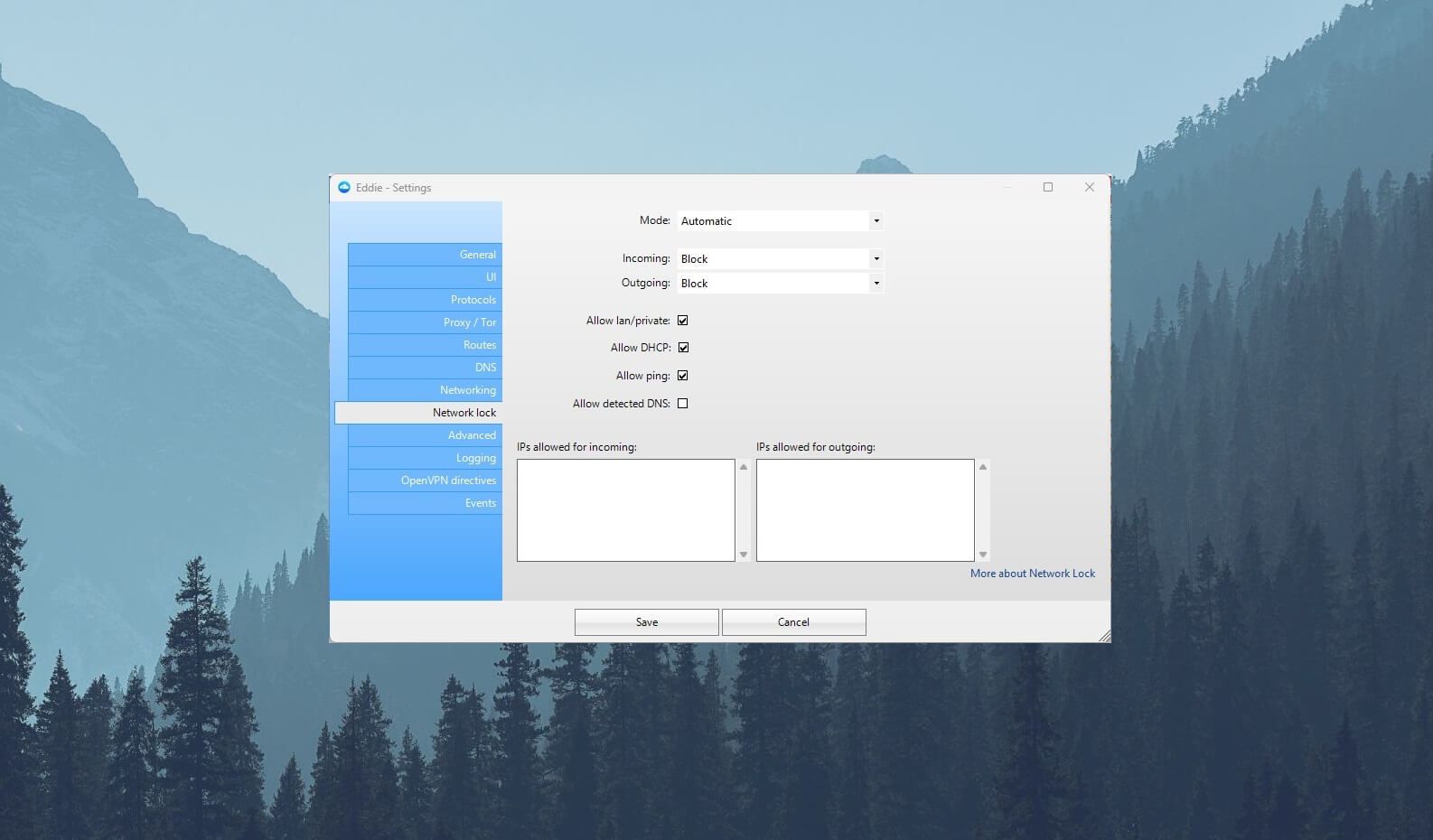
When you enable it, ALL traffic is disabled until you connect to a VPN. Of course, it’ll also disable your internet access if the VPN connection loss occurs but this is just an added effect that improves your overall security and makes sure unwanted leaks are avoided.
WireGuard Support
AirVPN relies on two VPN protocols for tunneling – WireGuard and OpenVPN. In its application, you’ll find more than 20 OpenVPN and two WireGuard options. Basically, AirVPN lets you choose from a variety of ports for each protocol, but that’s not all.
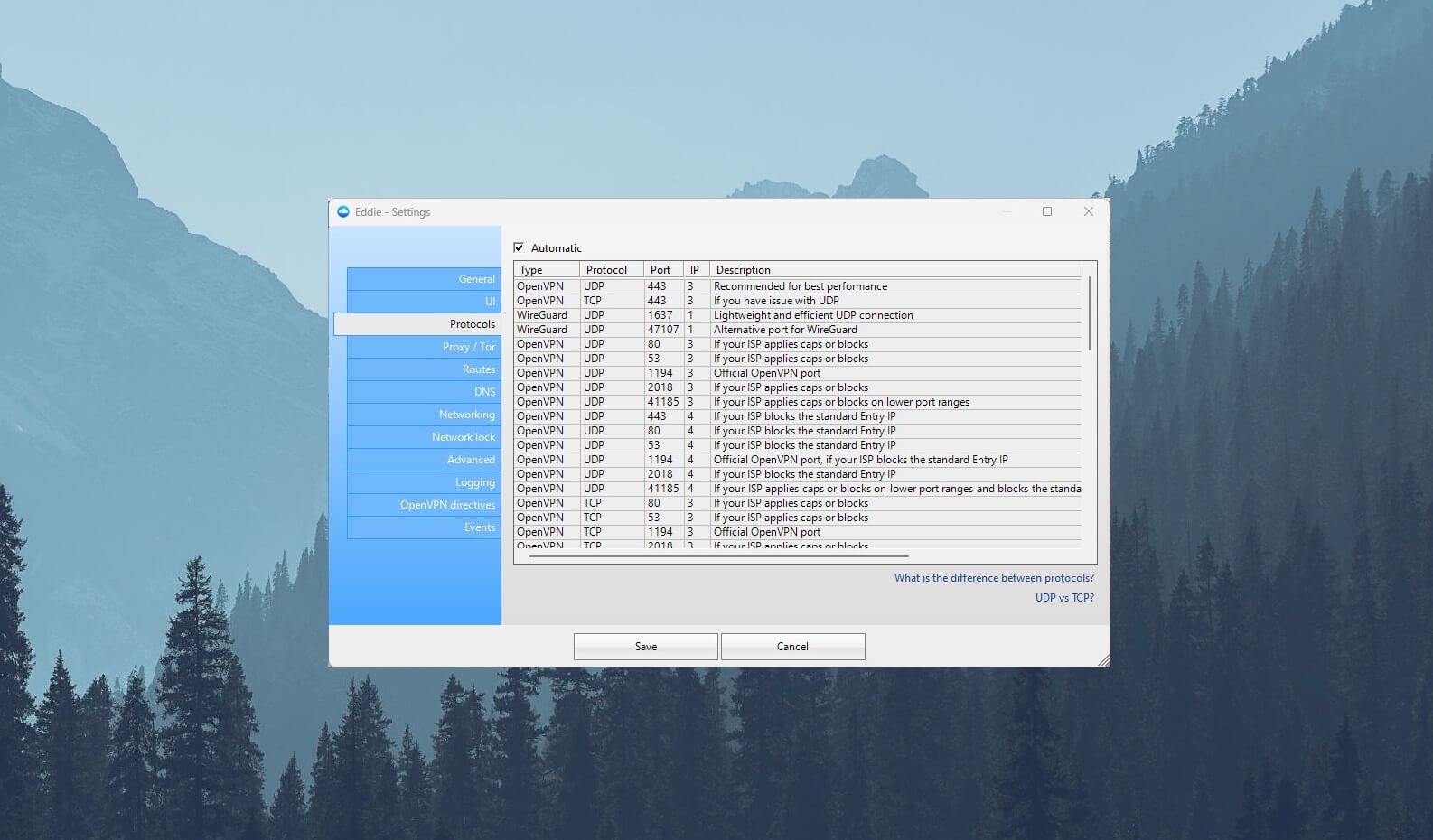
It explains each port and its function, which is very handy if you’re not very good at remembering them. For example, the typical OpenVPN UDP 443 port has the best performance, while 443 TCP is here if you experience issues with UDP.
WireGuard uses only the UDP protocol and AirVPN recommends the 1637 port for great connection speeds. Aside from UDP and TCP protocols for OpenVPN and WireGuard, you’ll find SSH>TCP protocols that should help bypass caps or blocks imposed by your ISP.
The protocol selection is Automatic but if you untick the box next to this option, you can manually choose the combination of the protocol and port to suit your needs.
Support for Proxies
AirVPN’s inclusion of proxies is more than welcome. If you thought about using a VPN with Tor, with this provider, you don’t have to. It offers proxies like Tor, Socks, and HTTP, where you can fully customize each option.
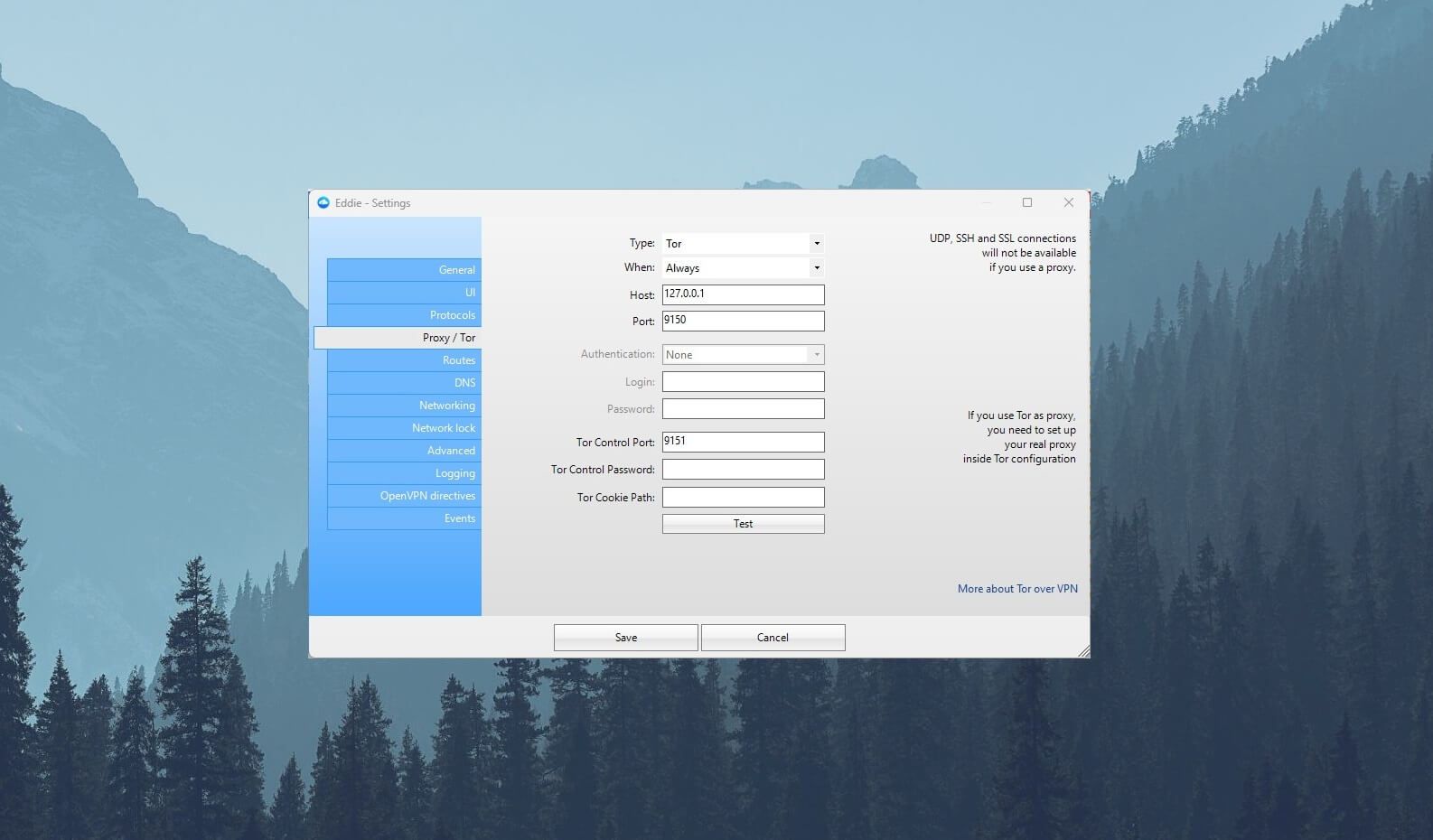
Each proxy can be configured concerning the port, host, and the situation in which the proxy should be used. You can then, use a proxy for OpenVPN requests, for web requests, or always if you want to make sure your selected proxy works regardless of the situation.
Routes (Split Tunneling)
Another great feature in this AirVPN review is called Routes. This is basically split tunneling, which allows you to choose the IP/Host/Range that will or won’t use a VPN tunnel. Since the provider is more advanced than many of its rivals, it offers the ability to set custom rules.
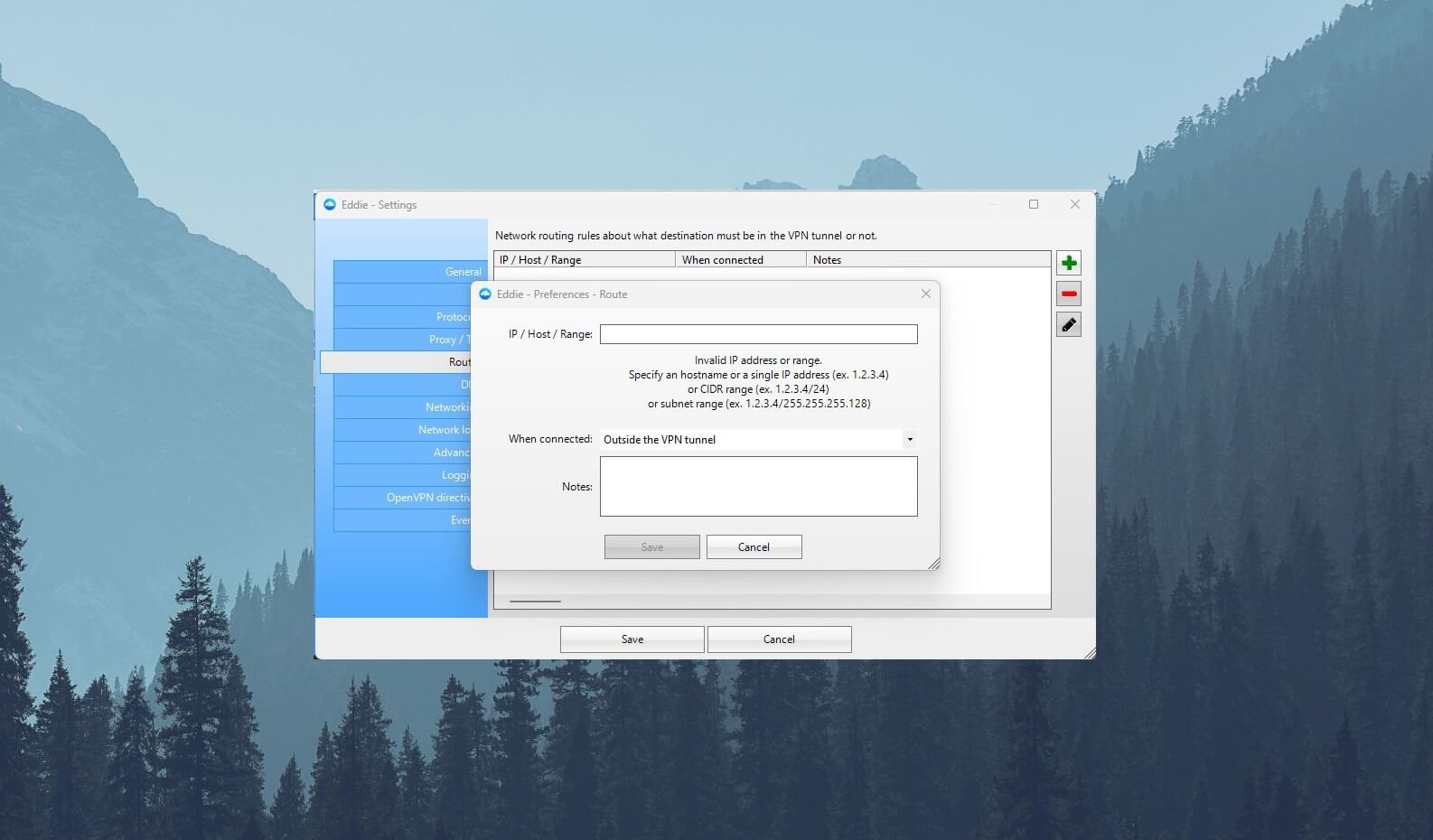
Aside from configuring a single IP, you can set a range of IP addresses that will or won’t go through the tunnel. It also allows you to add notes, which makes the feature more versatile and suitable for complex rules that you need to remember.
I used this feature on several occasions and I must admit it works perfectly, especially with the ability to customize the way it functions more than with other providers.
AirVPN DNS
A service like this is bound to offer some DNS settings. As you can guess, AirVPN has an in-house DNS server that prevents third-party DNS servers from interfering with your traffic. As much, it prevents them from tracking your online activities and collecting your personal data.
AirVPN DNS is a no-log solution and by default, when connected to the provider, all your traffic goes through this DNS server. This ensures total privacy and security while going online or using this provider to bet online abroad, for instance.
In addition, AirVPN lets you add custom DNS servers in which case, you’re using third-party servers rather than AirVPN’s DNS servers. It’s a nice addition if you don’t like the company’s DNS for any reason and you want to utilize more secure solutions.
OpenVPN Directives
To make it stand above the crowd, the provider includes a feature called OpenVPN Directives. It allows you to implement base and custom directives to OpenVPN and thus, control exactly how it works. Mind you, this is perhaps the most advanced feature of the service and isn’t going to mean much for newbies.
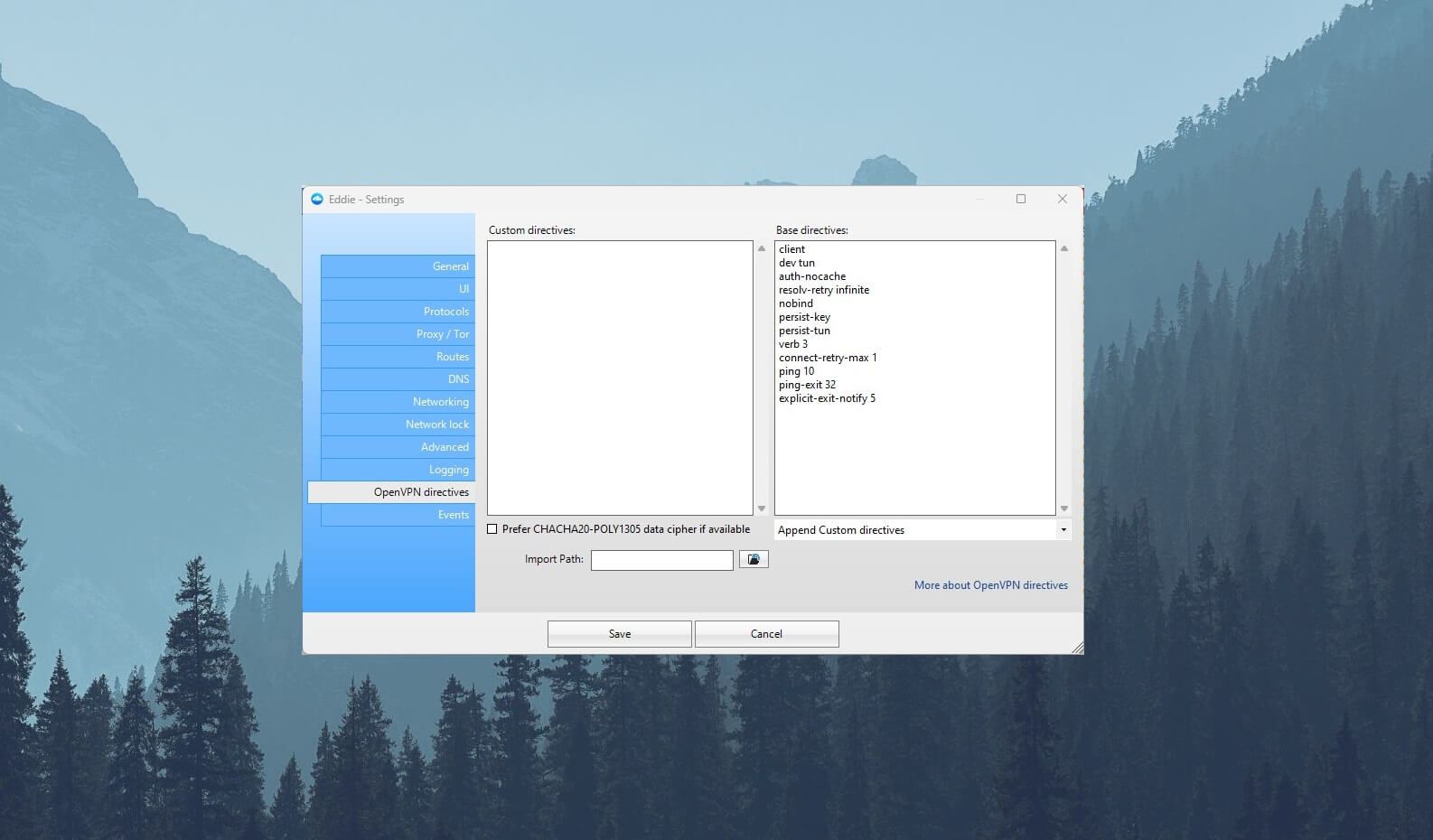
More advanced users who know every nook and cranny of cybersecurity will find it useful, along with various Networking options that let you select the OpenVPN buffer size, use IPv4 or IPv6 connections, and so much more.
AirVPN IP and DNS Leak Test: No IP/DNS Leaks Found
If you expect AirVPN to have any IP and DNS leaks, you will be disappointed. I mean, this provider is a bulwark of security and privacy and when using it, I never ever experienced a single IP or DNS leak. Still, I tested it for you to bring you proof.
First, I connected to the US server using this service and I visited a site called ipleak.net which is actually developed by AirVPN. The results below show no leaks, as my Eastern European IP address from Serbia is fully concealed.
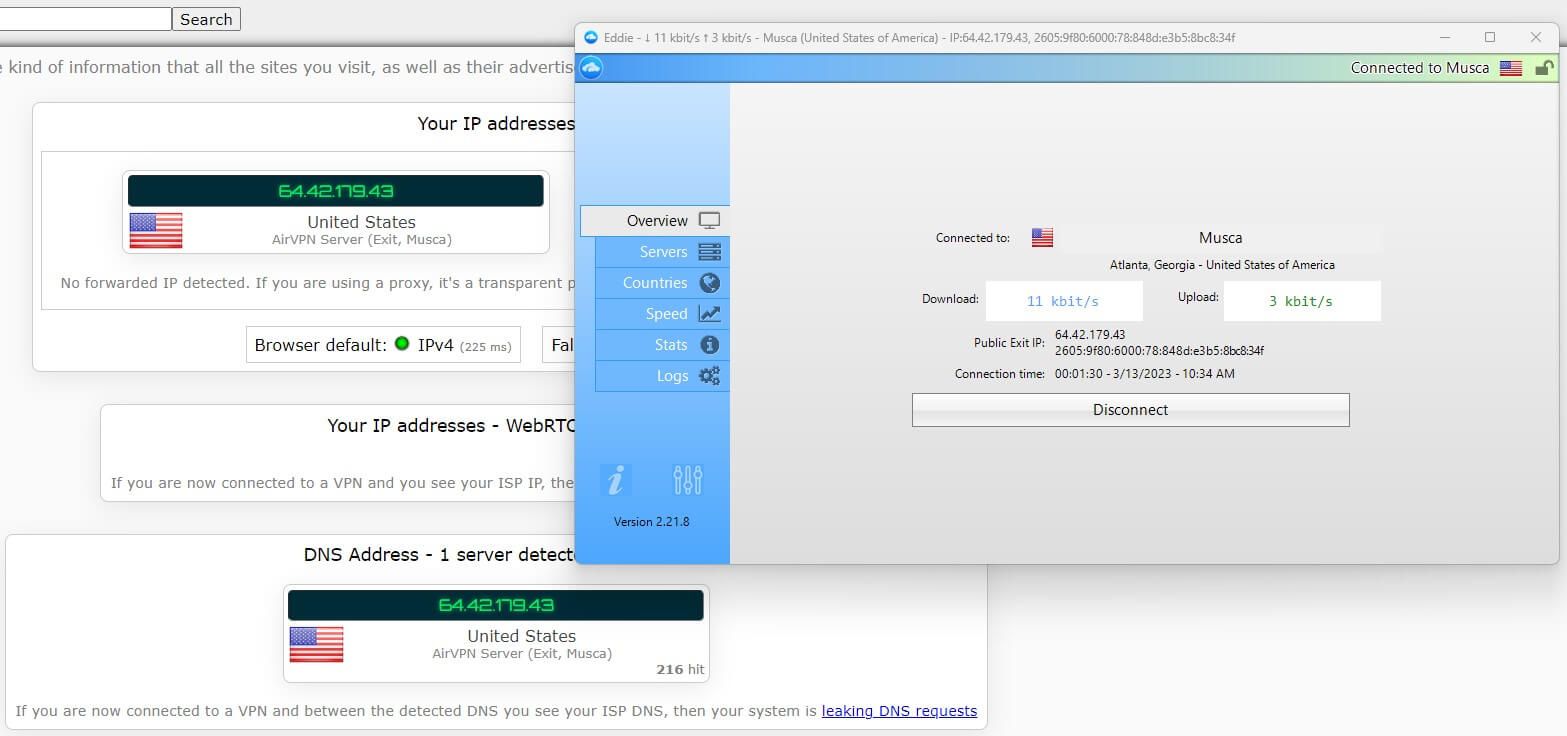
To confirm my results, I went to the website called browserleaks.com – this one isn’t AirVPN’s property, but the results were the same, which impressed me.
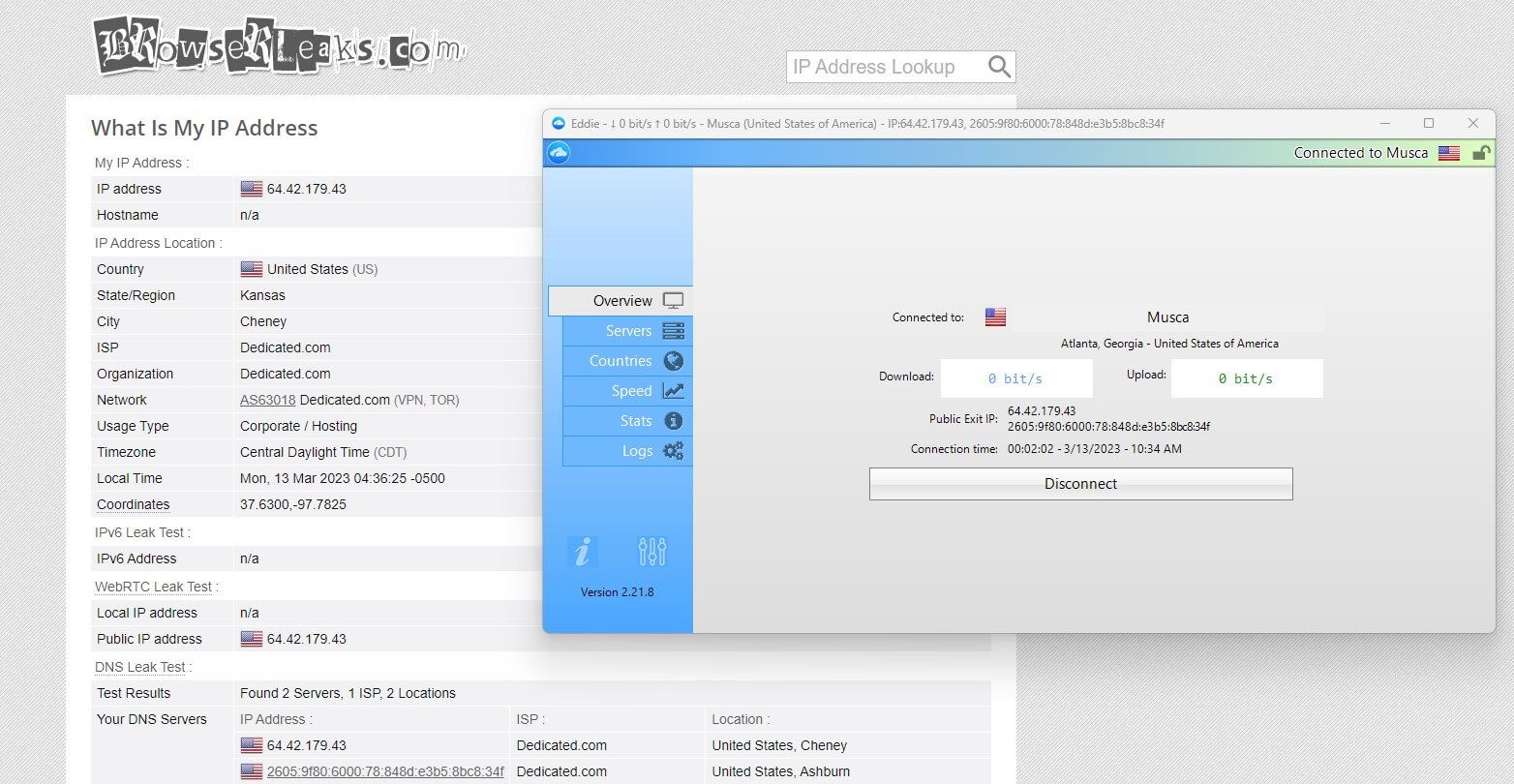
It’s easy to conclude that the provider is indeed safe and won’t leak your IP/DNS addresses as was the case with Turbo VPN or even FastestVPN.
Does It Have a No-Logging Policy?
Moving on with the AirVPN review for 2025, I think it’s a good time to talk about the provider’s logging practices and jurisdiction. As previously stated this VPN is located in Italy, where it was founded in 2010 by a group of hacktivists.
Initially, the company that operated this provider was Iridium but in late 2022, AirVPN became an independent company operated by a person called Paolo Brini, which you can see on its site. Currently, the company is based in an Italian city called Perugia.
The problem with Italy is that it’s a country within the European Union, so it’s not an ideal location for a VPN service. Data-retention laws are typical for the EU and many countries belonging to it are a part of the 9 or 14 Eyes alliance. In short, these countries aren’t privacy-friendly.
However, AirVPN seems to be on top of its game and so far, it hasn’t had any incidents or scandals involving data leaks. In addition, the provider indeed has a no-logging policy, and although it’s somewhat vague, researching it deeper for this AirVPN review and talking to support made us bring some conclusions.
Which Information Isn’t Stored?
Namely, the provider’s privacy policy is very strict, so it stores none of the compromising information. This includes the following data:
- Your IP address
- DNS queries
- Outgoing/inbound traffic
- Browsing history
- Websites your visit
- Geolocation, and other relevant information.
AirVPN also won’t store logs of information like connection timestamps, which means it’s impossible to identify you online. Generally speaking, this is one of the best VPNs with no logs that will take utmost care of your online privacy.
Which Information Is Stored?
When it comes to storing data, AirVPN follows the minimalist route. It stores some technical information for the service to function properly and for troubleshooting purposes. In addition, it may store your contact information and payment data, which is mandatory for the subscription to work.
I really like that the company lets you request the deletion even of this data, making sure you leave no traces of your online footsteps on its servers. All in all, we can’t complain when it comes to the overall privacy and security that AirVPN provides.
While we think that the Italian jurisdiction is far from ideal for a VPN service, it quickly fades away when you look at how little information the provider stores. This, I think, is better than having a provider within a privacy-friendly jurisdiction that still stores logs.
AirVPN for Streaming: Streaming Platforms TESTED
This AirVPN review quickly goes from ups to downs and that’s especially prominent in terms of streaming. I’m glad that the company put its best foot forward security-wise but streaming is also an integral part of the service – something that it failed to realize after all these years.
Even in 2025, users are complaining about its streaming capabilities left and right, so I wanted to test it and see how well it really works. To be honest, users online were right. I tested all of the popular US streaming services and none of them worked with AirVPN.
Keep in mind that I’m from Eastern Europe so I don’t have access to them natively. Even the catalogs of particular streaming platforms couldn’t be unblocked and I was left gazing into a few error messages implying that I was using a VPN, with a big bad block preventing my access.
AirVPN is capable of unblocking a few foreign TV channels, however. Although, if you’re into watching US TV channels anywhere, chances are that many of them won’t work – especially the most prominent ones. Less popular channels can be unblocked and you won’t have issues in this regard.
We found out that AirVPN has no dedicated streaming servers either and this benefit isn’t mentioned anywhere on its site. While those focused on privacy and security won’t mind being unable to stream geo-restricted content, “ordinary” users will find this a big downside.
Speed Tests: Here’s How Fast AirVPN Really Is
If it’s not great for streaming, is it at least fast? Well, I’d use the word “so-so” in this case. AirVPN isn’t a champion in terms of performance – that title belongs to ExpressVPN – but it’s not painfully slow as is the case with many of its rivals.
Nevertheless, I still tested AirVPN thoroughly and I’m ready to give you the speed test results. Before that, you need to know a few bits of information. Namely, I’m located in Eastern Europe, and my native internet speeds without using a VPN are the following:
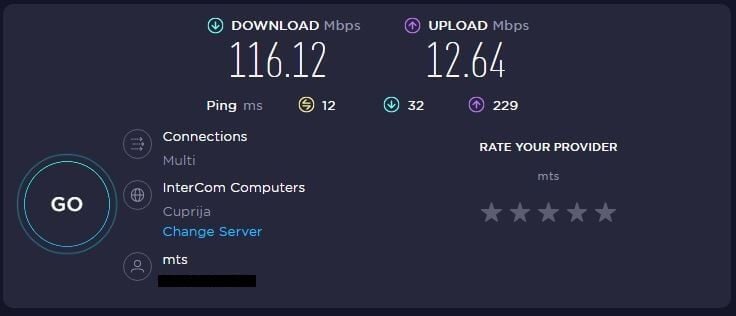
For this AirVPN review, I tested the service for 3 days in a row, conducting speed tests 3 times a day. However, I used 4 server locations (countries) – the UK, the US, Singapore, and Japan. As such, I made sure to include both near and distant servers to give you real-world results.
When it came to the protocol I was using, I left this to the app to decide. In other words, I set the option to Automatic, making sure the app selects the best protocol according to the server I was using. And with that out of the way, the speed test results are below:
UK:
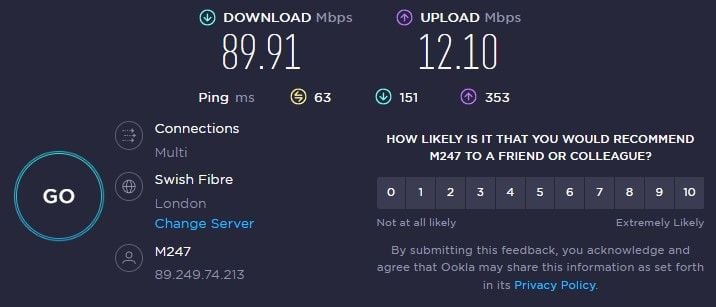
US:
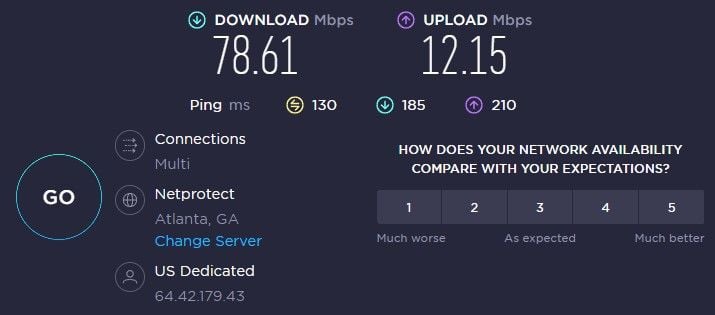
Singapore:
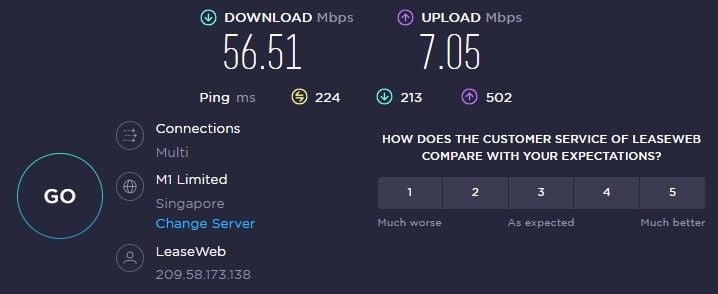
Japan:
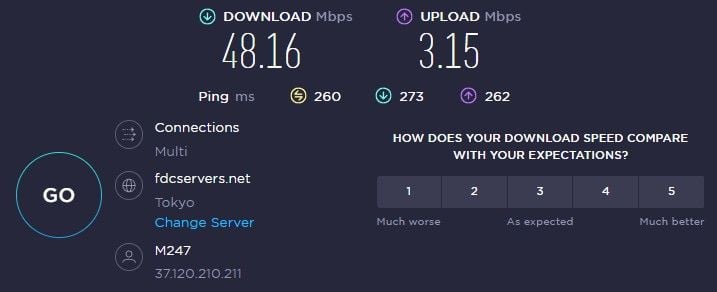
As you can see, the service isn’t particularly fast but we can’t say it’s a bad performer. I used the servers with the least load to make sure I got great performance. And in this case, servers in the UK and the US were reasonably fast with relatively low latency.
Moving on, the Singaporean server bumped up my ping quite a bit, although it wasn’t 300+ ms as some other providers are known to do. The Japanese server’s results weren’t very encouraging and the server showed the least impressive performance out of the four locations.
Is AirVPN Good for Gaming?
Gaming with AirVPN can range from decent to catastrophic depending on the server location. I used a Japanese server just to see how well I can play COD Warzone and Fortnite on my PC but the latency was very high so I ended up being kicked from the servers as a result.
Using some European servers, I could maintain great gaming performance and even achieve solid scores in both of these games. People looking for a gaming VPN shouldn’t consider AirVPN if they plan on playing games on distant servers on other continents.
For this purpose, you need an extremely fast VPN like ExpressVPN or CyberGhost. The same applies to cloud gaming where AirVPN’s performance isn’t the best, with frequent input lagging and even some crashes when playing games on Xbox Cloud Gaming.
Mobile users will have a slightly better time but that’s if you can get over its outdated app design and the fact that you need the OpenVPN client to run it on iOS.
Can I Use AirVPN for P2P and Torrenting?
Being a safe and secure VPN, AirVPN already has one important prerequisite for torrenting. However, another prerequisite is good performance, which the provider manages to achieve when using servers on your continent or in surrounding countries.
Besides, there’s no point in downloading torrents using distant servers since you’re looking to maximize your upload and download speeds. I connected to a server close to me, visited 1337x, and downloaded Linux Mint – a copyright-free OS.
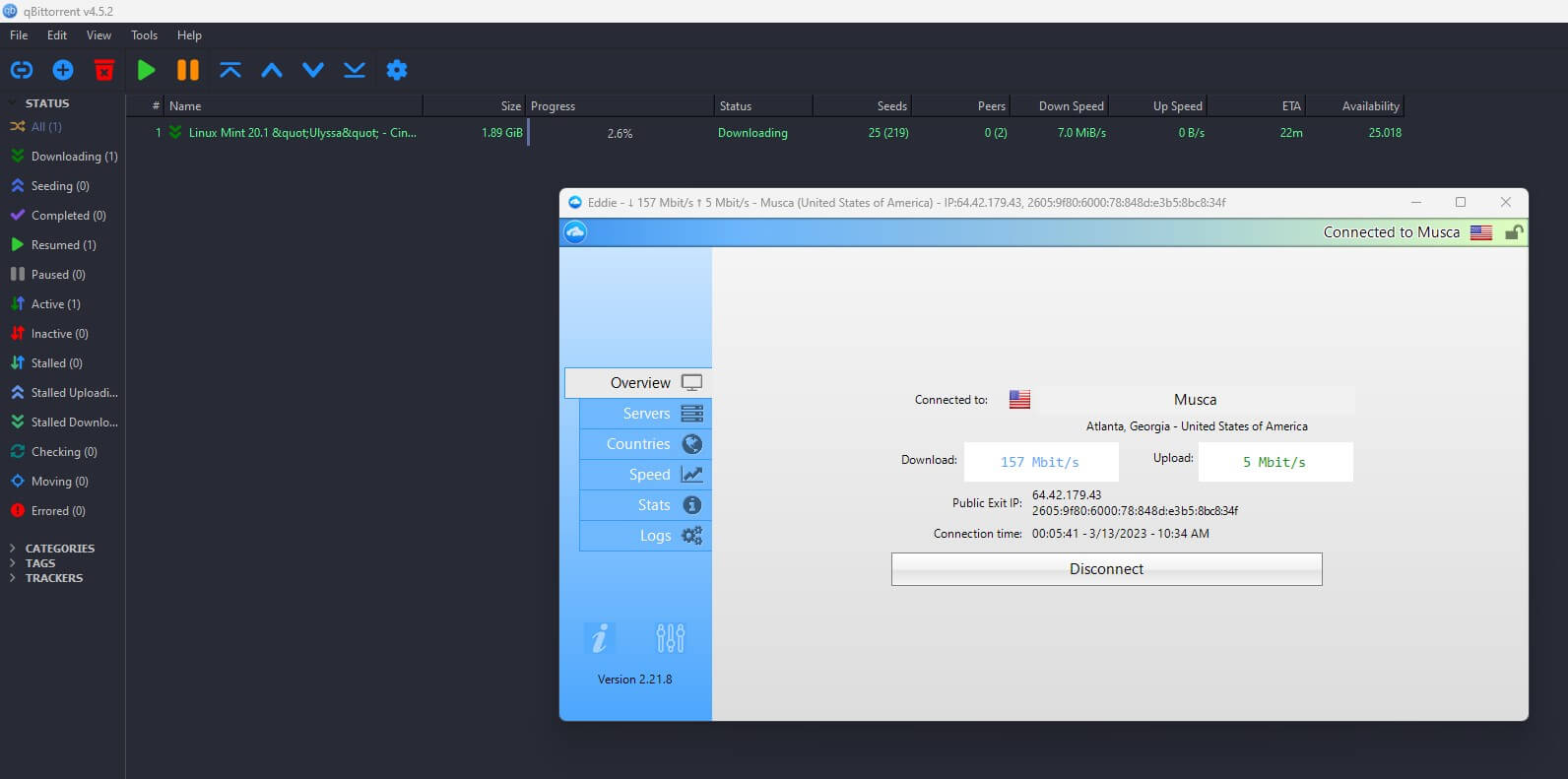
The screenshot above shows you that the attempt is successful and I was pleasantly surprised that I saw very little speed reduction. AirVPN also supports port forwarding, which should accelerate transfer speeds even more – a handy feature for those who download torrents often.
Plus, every server allows for torrenting and you’re not limited to particular servers only. We’ve had this situation in the review of Norton Secure VPN and it was disappointing. Thankfully, AirVPN’s torrenting capabilities extend far beyond a few servers, making it easy to find a fast and reliable server.
Is It Working in China & Other Censored Countries?
Bypassing censorship is getting harder these days, especially in China where the Great Firewall grows stronger each day. AirVPN has advanced security features and even includes obfuscation, which allows it to work in harsh conditions under severe firewall restrictions.
Our testers in China had a relatively good time with it and the service actually worked, although with tons of advanced customizations and tweaking. It won’t work with WireGuard, so you’re left with OpenVPN and many of its ports and protocols to test out.
For instance, our testers had luck with OpenVPN SSL>TCP and SSH>TCP protocols using different ports. In this case, AirVPN worked well and it could bypass the Great Firewall, although there was a performance hit that lowered our speeds.
Using a combination of advanced parameters, you can also make AirVPN work in Turkey or even Iran. However, if you think about ExpressVPN, this provider works in all of these countries out of the box, without needing to apply different tweaks and settings.
On top of that, it’s also much faster compared to AirVPN, so it’s still an option we’d rather recommend. But if you’ve set your eyes on AirVPN… well, know that it will work in censored countries as well.
Servers and Server Locations
So far in this AirVPN review for 2025, the provider did hit some highs and lows. Now, it’s time for another low, which is the number of servers and server locations. Maintaining a big server park takes a big budget which this provider obviously doesn’t have.
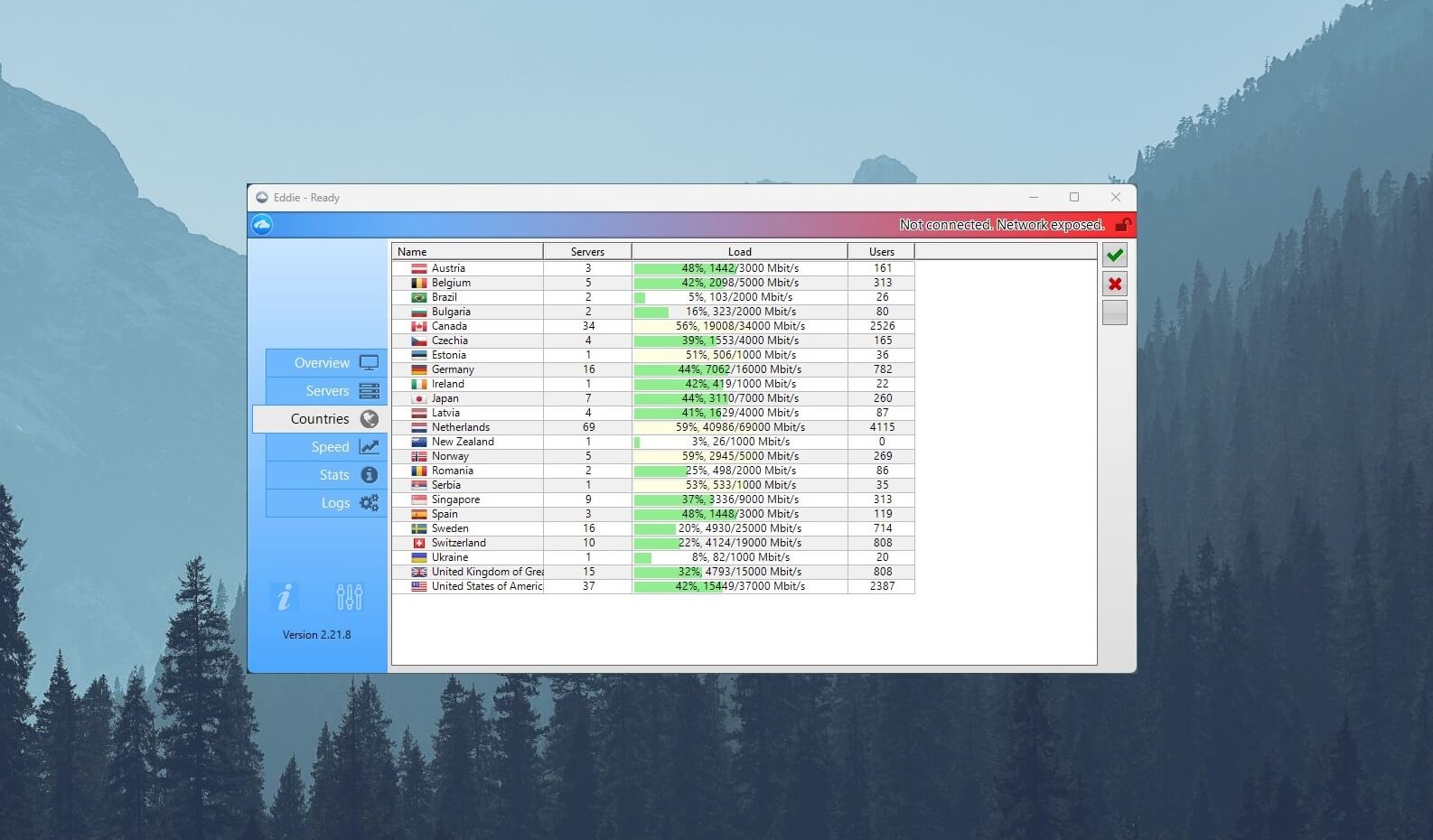
Large providers like CyberGhost or ExpressVPN with servers in nearly 100 countries are far more popular and they have higher demands for servers. AirVPN’s server network is minuscule in comparison and counts just above 200 servers in 23 countries.
The server distribution isn’t particularly great and the provider has servers in all of the typical locations. In the US, there are 37 servers while in the Netherlands, AirVPN counts 69 servers in total. Interestingly, there are no servers in Australia or Argentina.
African servers also aren’t on the list and you’ll find just two Asian countries here – Japan and Singapore. At least you get to see the speed of each server along with the load, which lets you determine the best location for your needs.
This doesn’t remove the fact that AirVPN’s server network is an utter disappointment both in terms of size and variety. If you want more servers and locations to work with, check CyberGhost or ExpressVPN. You can also see our PIA VPN review if you want a provider with 30,000 servers in 90+ countries.
Customer Support: How to Contact AirVPN?
AirVPN’s customer support isn’t anything to write home about. We expected not to find 24/7 live chat support and in the end, that’s what we got. The provider functions thanks to the community that keeps it alive, which is, thankfully, active.
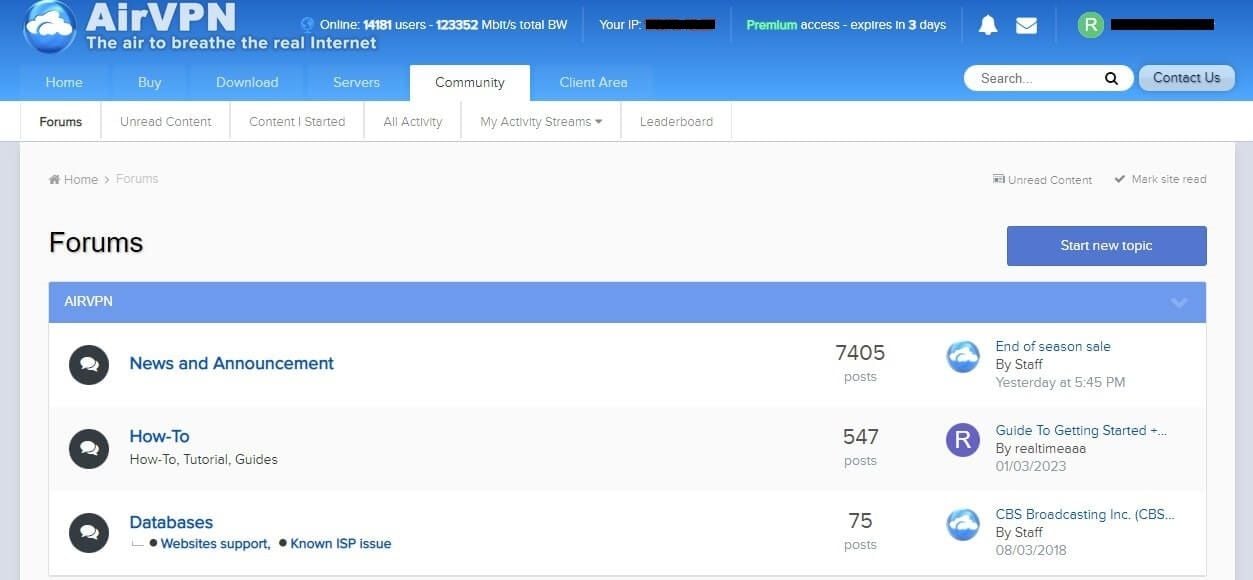
Once you visit its site, you can click on Community, which will bring you to the forum. Here, you can open new topics, ask questions, and get help from both administrators and active members. But if you don’t want to use its form and you’d rather rely on customer support, that can be done.
By clicking on Client Area, you can open a new support request which will be sent to the provider’s email. After that, getting a response is usually within a few hours but more often than not, that period extends to 24 hours or more.
The support team isn’t particularly fast but it’s helpful enough if you have minor issues. Through it, you can also request a refund or get answers to typical questions. When it comes to FAQs and how-to guides, AirVPN relies on its Community part for that.
If you want to get help without contacting anyone, you can resort to the How-to and Databases tabs on the forum and read through countless articles. However, I think that customer support could be done much better and generally speaking, I’m not very satisfied with AirVPN in this regard.
AirVPN Pricing Review
Having discussed all the technical stuff about this service, it’s time to see how much it costs in this AirVPN review. The great thing is that the provider is pretty flexible, so you have plenty of plans to choose from to adapt the service to your financial possibilities.

Since this is a European VPN, the provider lists its prices in Euros. I won’t talk about all of its plans, instead, I’ll mention the most important ones I think are worth considering. The monthly plan will cost you just above $8, which isn’t too expensive.
There’s the annual plan at just around $3.5 a month while the cheapest 3-year plan is priced at around $2.2 a month at the time of writing this test. Overall, AirVPN isn’t expensive and you can actually say it’s among the cheapest VPN providers on the market.
Is it worth the price? Well, that depends on your preferences. For me, it’s much better to look for an alternative. CyberGhost is actually a great alternative to AirVPN because it costs pretty much the same AND it’s much better for streaming and device compatibility.
Available Payment Methods
If you want to purchase AirVPN, you’re looking at plenty of payment methods. Aside from PayPal and credit/debit cards, the provider supports Google Pay, Apple Pay, Amazon Pay, Sofort, Giropay, and other relevant payment providers.
To that, we should add plenty of crypto options ranging from Bitcoin and Litecoin to Ethereum, Monero, Doge, and Bitcoin Cash. Best of all, cryptocurrencies are accepted directly by AirVPN with no intermediaries, which eliminates the fees completely.
How to Get a Refund from AirVPN?
The refund policy of this provider is straightforward and you get a 30-day money-back guarantee for all plans. It’s a no-questions-asked refund policy, so if you want your money back, they’ll give it to you without asking questions and poking around.
Just contact the support team by creating a new ticket and requesting a refund, and you’ll be reimbursed usually within a few business days.
What We Don’t Like About AirVPN
On a grand scale, AirVPN isn’t a bad VPN service but there are still a few things we dislike. For one, it’s a very complicated provider in terms of app design and setup, which will surely put off a LOT of people, especially those used to services like ExpressVPN, NordVPN, and CyberGhost.
AirVPN also doesn’t have proper support for Apple TV, Fire TV Stick, and iOS, taking advantage of the OpenVPN client instead. As such, it’s far more complicated for beginners, yet, it doesn’t justify its complexity with groundbreaking performance.
Speaking of which, the provider didn’t impress us in terms of streaming. It leaves a lot to be desired, as it couldn’t unblock a single geo-restricted popular streaming platform. Its server fleet is one of the smallest in the business with 200+ of them in 23 countries.
This, coupled with slow-to-respond and unintuitive support surely doesn’t make this provider exciting to use. All in all, it leaves an impression of an older provider while having cutting-edge security and sadly, I think it’s what makes a lot of people look elsewhere and avoid this provider.
How Do Other People Rate AirVPN?
Before concluding this AirVPN review and test, let’s see what other people think of it. The first site I checked was Trustpilot and here, the provider isn’t the best, with 3.5 stars out of 5.
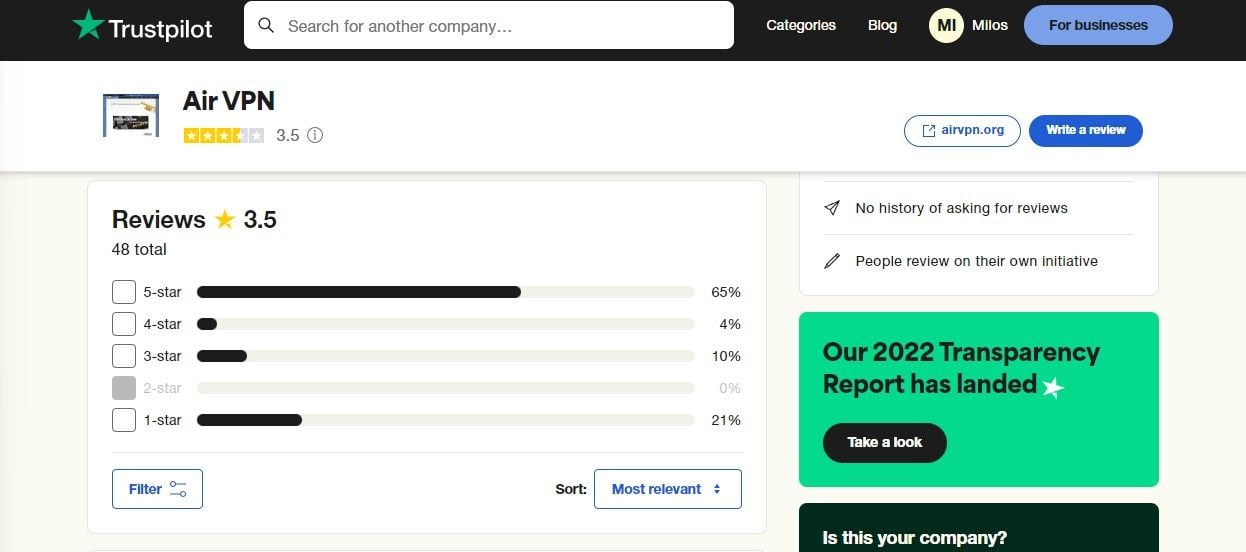
While people seem to praise its transparency and security, many users complain about slower speeds, unstable connections, and poor gaming performance. Not to mention complaints about customer support, which many people seem to dislike.

On Google Play, Android users gave AirVPN 3.4 stars, which is slightly less. Android users point out its confusing application, outdated design, and sometimes slow speeds. Much like users on Trustpilot, they also praise its security, privacy, and customization features.
We couldn’t see what people on the Apple Store’s site think of it because of the lack of a native app. From all of the reviews we gathered online, these were the positive and negative things in most of the cases, so it’s pretty clear how other people see AirVPN.
Conclusion: Safe & Secure, But Very Flawed
At the end of the day, one question remains – do I need a VPN like AirVPN when there are other, much better providers at a similar price? The answer, at least for me, is NO unless you’re looking for a highly customizable experience focused strictly on privacy, security, and anonymity.
Undoubtedly, this provider is one of the best options for fully customizing your experience and making sure you’re covering every aspect of your online security – with one condition – having great knowledge. Ordinary people who like a plug-and-play method of using VPNs won’t find much use for it.
They’d rather get ExpressVPN, CyberGhost, or NordVPN, click once to connect, and enjoy all of the benefits without the hassle. That’s not to say that AirVPN is bad but it has serious flaws in terms of streaming, app support, customer service, and ease of use.
And while it’s very affordable, we still can’t recommend it when there are better providers at, more or less, the same price, such as Surfshark or CyberGhost. Actually, if your budget isn’t limited, I’m more inclined towards ExpressVPN as the absolute best provider.
You will pay more but you get significantly better performance, lots of streaming possibilities, 24/7 customer service through live chat, and so much more. We gave you plenty of options and in the end, it’s up to you to decide. Will you get AirVPN or some of its better alternatives?
